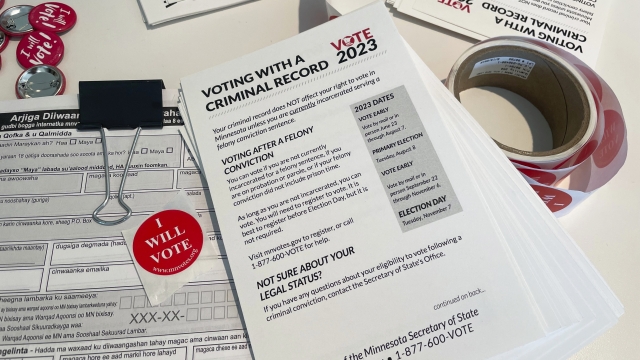It's a common practice in the United States that disproportionately affects Black and Hispanic Americans who have been put behind bars: disenfranchisement in federal elections. However, newly introduced legislation is trying to change that.
Legislation called the Inclusive Democracy Act would restore voting rights to incarcerated citizens and allow them to vote in federal elections.
"We are still in the Civil Rights movement and Jim Crow is not behind us," Rep. Ayanna Pressley, said on Wednesday. "Jim Crow is not behind us when state legislatures and extremist courts act daily to disenfranchise us and to silence our votes. Jim Crow is not behind us."
For Pressley, it's more than just a piece of legislation — it's personal.
"Growing up, my father Martin was absent for most of my formative years because his addiction was criminalized. This was incredibly destabilizing for our family. And, you know, I really feel my father was discarded. He was treated as if he was disposable and he was alienated from our society."
Sen. Peter Welch said in a statement that the bill is meant to help voters who have been "robbed of their right to participate in our Democratic process."
SEE MORE: Income program helps those formerly incarcerated stay out of prison
"The goal for all of us is to be full contributing members of the society, the neighborhood that we're in," Welch said during Wednesday's presser. "And one of the basic aspects of voting is you participate in the Democratic conversation about our community, our state and our world."
An estimated 4.6 million Americans are disenfranchised due to felony convictions, according to the Sentencing Project.
When it comes to voting rights for formerly incarcerated people, laws vary by state. To date, 48 states ban people with felony convictions from voting. Maine and Vermont are the only two states that allow people in prison to vote. And in the most extreme cases, 11 states continue to deny voting rights to some or all people who have successfully fulfilled their prison, parole or probation sentences.
Danielle Lang, the senior director of voting rights at the Campaign Legal Center, praised the legislation and urged Congress to pass it.
"There are so many people behind bars who have not been convicted of any crime that are awaiting trial and are presumed innocent until found guilty, but have no meaningful way to participate on Election Day," Lang said.
But there's a huge divide when it comes to restoring the voting rights for formerly incarcerated people. Most Republicans oppose the idea while many Democrats back it.
According to a 2019 study from Ragnar Research Partners, ex-felons are four times as likely to be Democrats or not affiliated with any political party.
"There's a real problem we have in this country, and that is there's a significant effort to keep people away from the ballot box," Welch said.
Trending stories at Scrippsnews.com



